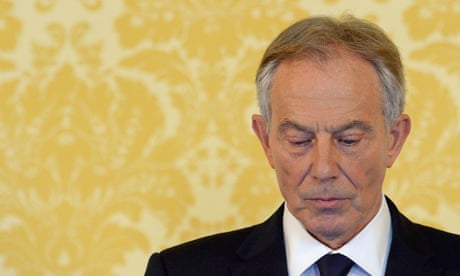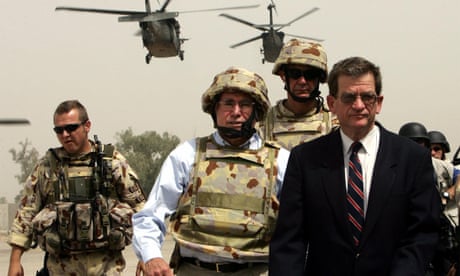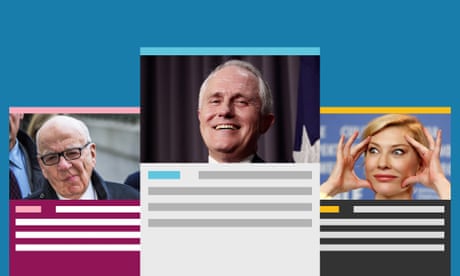John Howard defends Iraq war, saying it was 'justified at the time'
Former PM says claims Australia went to war on a lie are untrue: ‘There were errors in intelligence but there was no lie’
 Responding to the Chilcot inquiry into the Iraq war, John Howard says that while intelligence breaches had been discovered since the conflict, he stood by the decision his government took. Photograph: David Moir/EPA
Responding to the Chilcot inquiry into the Iraq war, John Howard says that while intelligence breaches had been discovered since the conflict, he stood by the decision his government took. Photograph: David Moir/EPAJohn Howard has defending committing Australian troops to the Iraq war saying he believed the decision was “justified at the time” and was not based on a lie.
“In the years that have gone by there’s been this constant claim that we went to war based on a lie,” Howard said. “There was no lie. There were errors in intelligence but there was no lie.”
Speaking in Sydney in the wake of the publication of the Chilcot inquiry, the former prime minister who committed Australian troops to the invasion said that while intelligence breaches had been discovered since the conflict, he stood by the decision his government took.

Tony Blair unrepentant as Chilcot gives crushing Iraq war verdict
“I believed that the decision to go into Iraq was justified at the time and I don’t resile from that because I thought it was the right decision.”
In the years subsequent to the invasion, significant criticism over the war has centred on the “September Dossier” of 2002, an intelligence briefing, now discredited, that alleged Saddam Hussein’s regime had weapons of mass destruction that could be unleashed in 45 minutes. Those allegations became a key element of the public and political argument in favour of war.
No weapons of mass destruction were found in Iraq by the invading forces.
But Howard said Chilcot found the government had not doctored the dossier or pressured intelligence agencies to do so.
“One of the most important conclusions ... was the [UK] joint intelligence committee accepted ownership of the dossier and agreed its content. There was no evidence that intelligence was improperly included in the dossier or that Number 10 [Downing Street] improperly influenced the text.
The Chilcot report was excoriating in its assessment of the British government’s decision-making process over going to war, saying that the threat posed by dictator Saddam Hussein was overplayed, intelligence was flawed, and the legal basis for the war was unsatisfactory.
Chilcot also found that the decision to go to war was taken before “peaceful options for disarmament had been exhausted”, in particular that diplomatic overtures to secure a security council authorisation at the United Nations had not been extinguished.

Australia can learn from Chilcot report, says ex-Greens leader
Read more
Howard said he disagreed with Chilcot’s conclusion, saying “there was no hope” that France and Russia would agree to a security council authorisation for military action.
“It was very apparent to me, it was very apparent to the national security committee of the Australian government, that the combined determination of the Russians and the French to frustrate that further resolution meant that the diplomatic road had come to an end.
“Chilcot forms a different view – and you’ve got to remember when you’re dealing with things like that, that there are differences of judgement. I respect his view but I disagree with it.”
Howard said he regretted the loss of life in military conflict, but was willing to be held accountable for what occurred in the Iraq war.
Advertisement
“When you’re dealing with intelligence it’s very, very hard to find a situation where advice is beyond doubt,” he said.
“Sometimes if you wait for advice that is beyond doubt you can end up with very disastrous consequences.”
In the wake of Iraq, the UK has adopted the practice of holding a debate in the House of Commons over decisions to commit troops to conflicts. Howard said he did not think Australia should do the same, and that the decision over armed forces was a key “responsibility of the executive”.
Andrew Wilkie, the newly-re-elected independent MP for Denison, resigned in 2003 from his role as an intelligence analyst with the Office of National Assessments in protest against the Australian government’s decision to join the invasion of Iraq, arguing military intervention was not justified and intelligence was misrepresented by politicians.

The stories you need to read, in one handy email
He said the Chilcot report vindicated his position.
“John Howard and Tony Blair and George W Bush do stand accused of war crimes. I’d like them to see an international court. I would like them to defend their position and try to prove their innocence because all of those people who do accuse them of war crimes, I think make a pretty compelling case.
Howard said Wilkie’s comments were “absurd”.
“Andrew Wilkie said the Iraq invasion was responsible for the Bali attack of 2005. What about the Bali attack of 2002, infinitely greater? And he blamed it for the Lindt cafe siege. I mean, this is irrational.”
Comments
Post a Comment